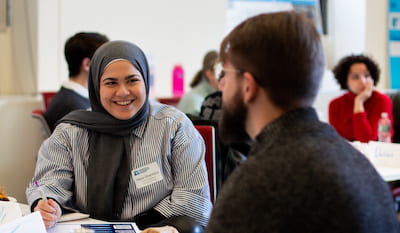Students as Pedagogical Partners Initiative

About the Students as Pedagogical Partners Initiative
Student-faculty partnerships are intended to promote engaged learning, create more inclusive learning environments, and transform teaching and learning at Columbia. This initiative draws on models at other universities and the literature on pedagogical partnerships. While partnering with faculty to co-create learner-centered and inclusive classrooms, students increase their self-awareness and feel empowered to play an active role in their learning. Faculty learn from the students’ experiences and perspectives which in turn informs their own practices in meeting their students where they are.
Partnership Opportunities
Ask your students!
Are you a Columbia instructor wondering what your students think about particular engagement, assessment, or inclusion strategies? The use of instructional technologies to support their learning? How students might respond to a project or assignment? Or any other input on a class you are teaching? Ask your students for feedback!
Seeking student input is good practice. Consider collecting early and mid-semester student feedback from your students and use the information to start a dialogue about their learning in your course.
Provost’s Teaching and Learning Grants
The Office of the Provost provides funding opportunities for faculty looking to integrate new educational methods or technologies into their classrooms. Consider adding undergraduate students to your funded innovative project team! As part of the proposal, you can request funds within the project budget to compensate undergraduate student(s) of your choosing to assist with designing or redesigning syllabi, modules, assignments, activities, the creation or curation of course materials, etc. For these funded faculty-student partnerships, the CTL will provide support to the project team and professional development to the student(s).
Have questions about faculty-student partnership opportunities? Email the CTL at ctlfaculty@columbia.edu.
Past Offerings
Between Spring 2020 and 2023, the CTL worked with a cohort of Columbia undergraduate students from Columbia College, General Studies, and the School of Engineering and Applied Science, to partner with and bring them into conversations about teaching and learning with faculty.
Over the semesters, CTL student consultants have shared their experiences and reflections on being learners at Columbia with our teaching community. You can read more in the Resources Developed by Student Consultants section, and listen to them share their experiences in episodes of the Dead Ideas in Teaching and Learning podcast.
Resources Developed by the Student Consultants
The following resources were developed by the CTL’s student consultants as they reflected on their experiences with learner-centered teaching, active learning strategies, inclusive teaching and learning, the transition to remote learning, and online and asynchronous practices. Click on each to learn more about their thoughts and experiences.
Listen to the episodes of the Dead Ideas in Teaching and Learning podcast that feature our student consultants.
Season 6, Episode 7:
Season 5, Episode 7:
Season 4, Episode 7:
Season 4, Episode 1:
Season 2, Episode 7:
Season 1, Episode 4: